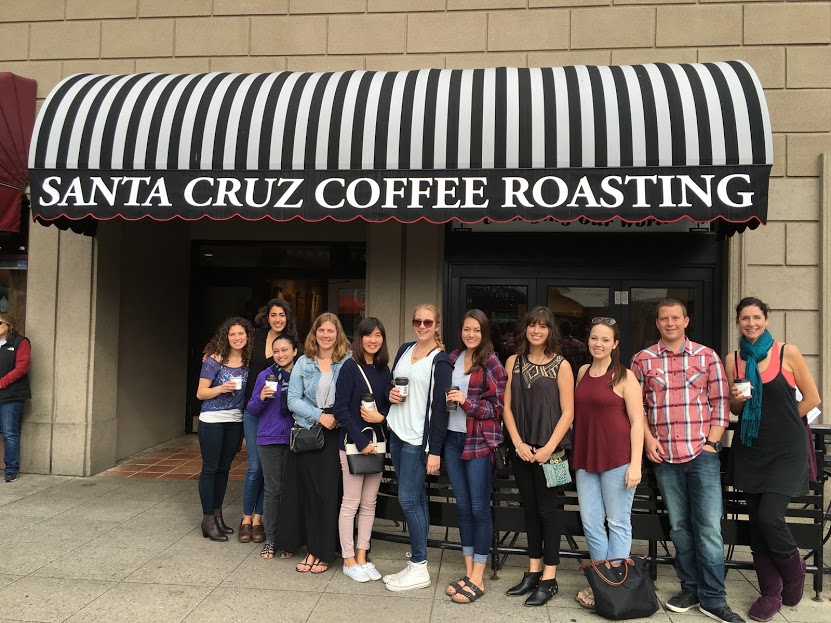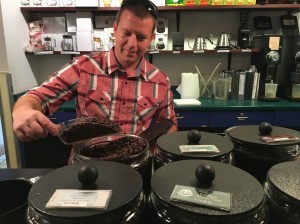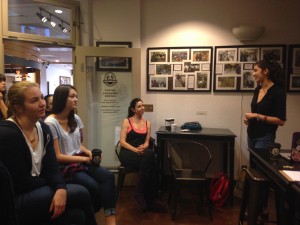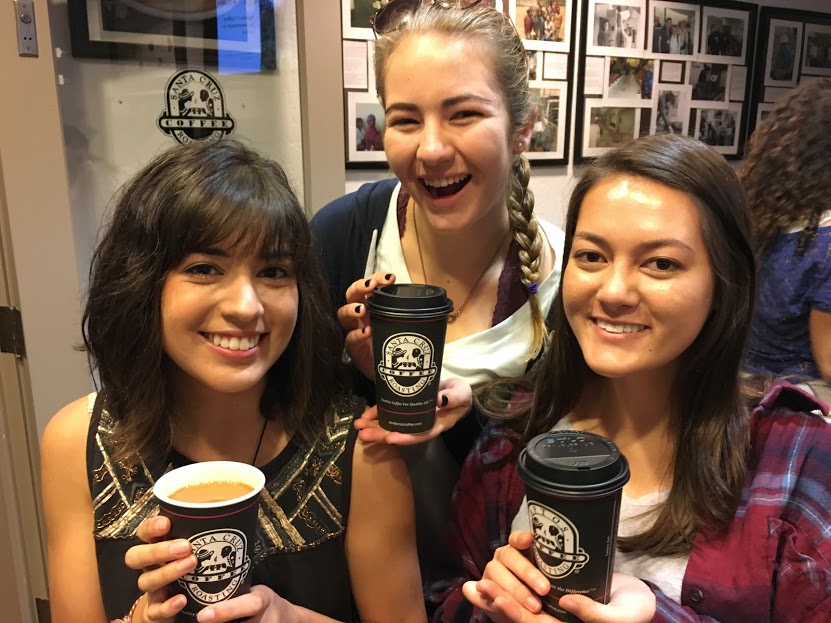Coffee & Collaboration: Visiting Santa Cruz Coffee Roasting Company with CAN

Stacy Stafford Scott (far right), Sterling Muth (second from right), Suraya Arslan (second from left), and I (far left) pose with the Spoon University students in front of Santa Cruz Coffee Roasting Company. Photo credits: Spoon University at SCU

Sterling preparing some CAN coffee for us Photo credit: Spoon University at SCU
Most Farm to Fork visits focus on good food and the relationship between Bon Appétit and a small farmer or artisan; I usually learn a lot about the food or crop and get a snapshot of the farmer’s passion and desire to do things unconventionally. But my visit to Santa Cruz Coffee Roasting Company was different: it was about celebrating a unique collaboration among Bon Appétit, a local coffee roaster, and a nonprofit driven by ethics and environmental stewardship.
I joined Bon Appétit Regional Marketing Manager Stacy Stafford Scott and the student leaders of the Santa Clara University chapter of Spoon University (a student-driven culinary website) for a special coffee tasting and presentation with Santa Cruz Coffee Roasting Company and the Community Agroecology Network (CAN). Santa Clara’s Sunstream Café serves CAN coffee, and this was a great opportunity to share CAN’s unique model and story with students. Santa Cruz Coffee Roasting’s Sterling Muth poured us some delicious coffee, and Suraya Arslan from CAN gave us an incredible presentation inside the Coffee Learning Center in the coffee company’s downtown Santa Cruz location.

Suraya tells us the story of CAN and its innovative approach
CAN grew out of a UC Santa Cruz research project that focused on the coffee crisis: a volatile market didn’t allow price consistency for farmers, and a widespread crop disease called la roya was wiping out 30%, then 50%, then 80% of many farmers’ crops. The research found many things, including that shaded fields weren’t as affected by the disease, and that Latin American coffee was only harvested once a year, so farmers only get one paycheck a year, meaning small farmers are especially vulnerable to the effects of price fluctuations and la roya. Many farmers also weren’t growing any subsistence crops and were experiencing seasonal hunger, while women weren’t being compensated for the work they were doing in their homes and in the field. Existing certifications that apply to coffee have limits — they stabilize the shocks but don’t ensure long-term sustainability by addressing these problems.
CAN is a nonprofit that focuses holistically on both sustainable coffee sourcing in Mexico and Nicaragua and improving the lives of the people growing the coffee. Agroecology is a whole-systems approach to growing food, and CAN’s Agro-Eco coffee embodies economic, environmental, and social improvement. In this model, everyone has a seat at the negotiating table determining the price of the coffee, and 79% of the price of the coffee goes directly to the farmer. Last year, it ensured a price that was 30% higher than Fair Trade.
CAN buys green coffee beans, and Santa Cruz Coffee Roasting Company does all of the roasting for CAN. They are engaged in a long-term partnership for better-quality coffee and a better quality of life. CAN doesn’t get a cut of the per pound coffee purchase, but they charge a per pound sustainability fee when they sell the coffee, which puts some money back into their operating budget.

Spoon University student leaders pose with their Santa Cruz Coffee Roasting Company CAN coffee. Photo credit: Spoon University at SCU
The CAN team is constantly re-evaluating the impact of their model and how to improve it by doing annual monitoring and evaluation. They are training women and youth to lead the social impact projects and do the monitoring and evaluation themselves. Farmers are cultivating shade-grown coffee and growing fruits and herbs alongside the coffee plants. Ten cents of the coffee price goes into a women’s economic empowerment fund, which includes projects such as a café in San Ramon, Mexico, and a national brand, FemCafe. Another 10 cents go into a sustainable agriculture fund, toward projects like composting and fungi experimentation. They are also working on family gardens to grow vegetables and chicken coups to produce eggs to help combat seasonal hunger, rescue traditional recipes, and diversify diets, and they have a powerful intergenerational, family focus.
Since their model is constant evaluation and improvement, what’s on the docket for future work? They will be digging more into gender equality issues: for example, women still do not have any legal rights to the land.
We learned a lot. But the two things that impressed me the most about the event were first, how much both Sterling and Suraya know about the entire growing, sourcing, and sales process. This is truly a partnership in which the folks at both Santa Cruz Coffee Roasting Company and CAN are knowledgeable about the problems and dedicated to working toward solutions. Second, how much CAN is constantly re-evaluating its model and its impacts. This continuous quest for improvement reminds me of what the Bon Appétit leadership team has alway said — and I repeat often to students— about how important it is to realize that “sustainability” is not an end goal, but a journey requiring us to question our choices constantly to make sure they align with our values.